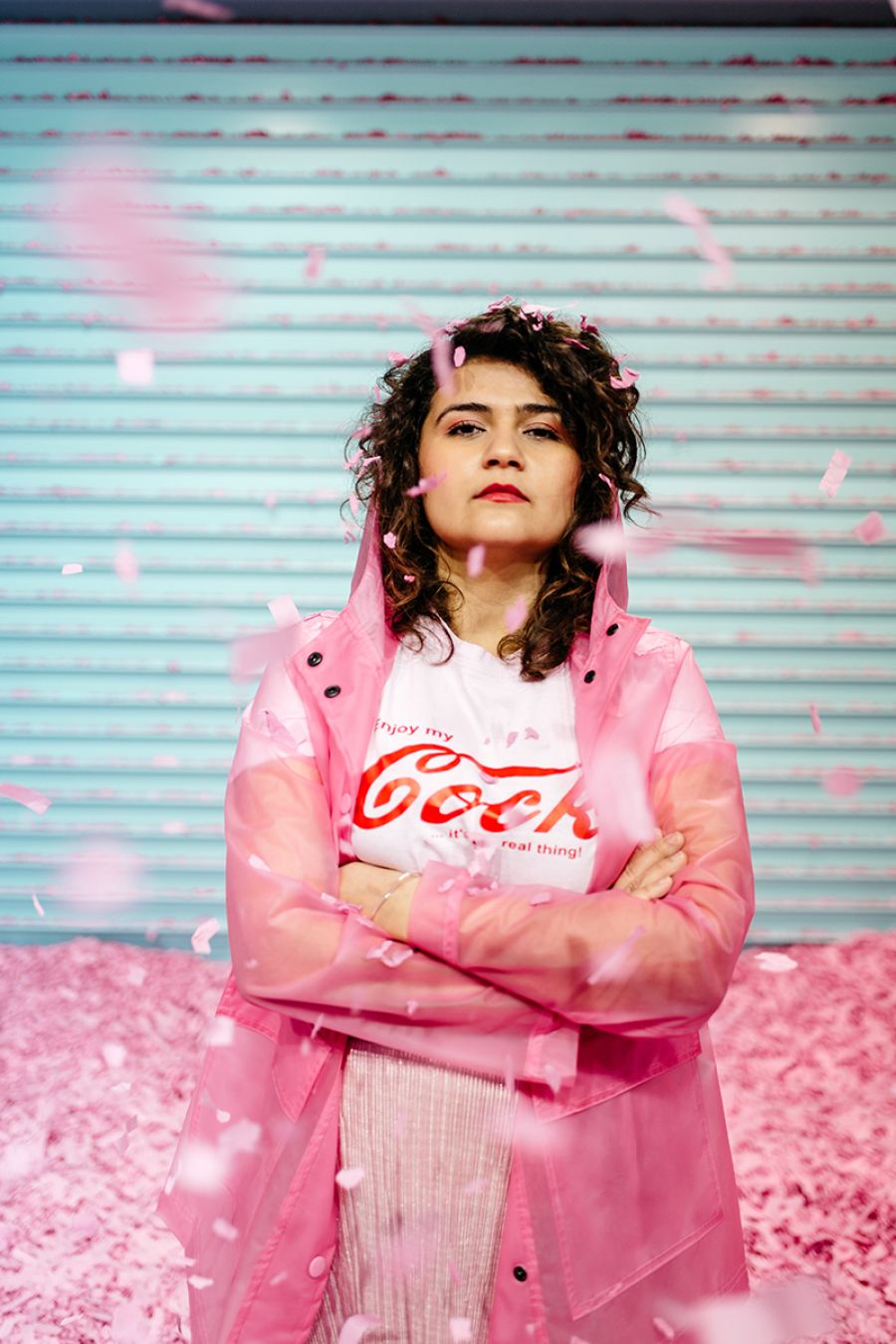Pink Power für Puccini - Deutsche Oper Berlin
Pink Power for Puccini
Remember GREEK, for which Pınar Karabulut sent blue centaurs flitting across our parking-deck venue? The director is now mounting her first opera on the main stage: Puccini’s IL TRITTICO. And get ready for colours.
She’s dressed in pink and black – and it suits her: pink hoodie to match her vivacity; black satin trousers to reflect the other side of her nature – feminine but also vulnerable.
Pinar Karabulut, 35, was born in Germany and is convinced that she belongs here, even though she’s always bumping into people who think otherwise. Karabulut grew up to be a director of theatre and opera, even though people – many of them pale, stale white men – advised her against setting her sights high. »You haven’t got any stories to tell. I picture you working in admin,« said one dramaturg. »You’re never going to direct in Munich,« another guy told her. »You’re better off at the Ballhaus Naunynstraße.« »And yes, it was meant in a racist way,« she says. For the last three years she’s been part of the team heading the Kammerspiele in Munich. »I was lucky in that I wasn’t intimidated by all that, because by nature I’m going to try harder if someone tries to put me down. But I know a lot of young women who take that kind of behaviour to heart. The sexism, too; not just the racism.«

It’s time for cake. We’re sitting in a café in the Schwabing area of Munich. The American cheesecake here is legendary. Pinar Karabulut takes a sip of her iced tea and says: »The thing I love about this small world is that people tend to meet twice: once on the way up and once on the way down.«
She describes as bumpy the path that led to her first independent work being shown at Munich’s Radikal Jung drama festival. That was INVASION in 2015. Karabulut was working as assistant director at the Schauspiel Köln and recounts how, unlike the other assistant directors, she spent a year struggling to get the green light to stage her own piece. When the invitation to Munich arrived, the attitude was: of course you got invited; you’re Turkish.
Radikal Jung is an annual showcase of the best works by young directors, so it was a real accolade. She was invited three times – a minor record. Things got easier, but not much. Apart from maybe in opera, she can’t think of a single job she’s done where she didn’t encounter sexism and racism. »When you land a job as a woman, you hear so many remarks. Very little has changed. One thing, though, is that people at least don’t say things straight to your face.«
That’s because she’s arrived. She’s directed at major venues: in Zurich, in Basel, at the Schauspiel Köln, the Volkstheater in Vienna and Berlin’s Volksbühne and Maxim-Gorki-Theater.
The artistic director at the Maxim Gorki, Shermin Langhoff, was previously head of the Ballhaus Naunynstraße. Her ensemble already consisted for the most part of actors with migrant roots, a pattern that she continued at the Gorki. A year after she took over, the venue was voted Theatre of the Year by »Theater Heute« magazine. »Suddenly everyone was thinking ‘OMG, we need someone with a migrant background at the theatre, or we won’t succeed as a venue’,« says Pinar Karabulut. »But that’s not being tolerant; that’s being strategic.«
Karabulut grew up in Mönchengladbach, had her first contact with theatre there, moved to Munich to study direction and worked as assistant at the Kammerspiele. »The first wage I got as an assistant was 500 euros. I felt rich – until I realised that everyone else was getting 1,500 euros.« Some people might be wondering at this point when all the disadvantagement in this potted biography is going to end, but later there are going to be anecdotes involving discrimination, because that’s the sad reality. The great thing about this one-of-a-kind artist is how she turns these – let’s call it by its name – disgusting things around: she creates positive energy out of them. Instead of giving in, she rises up; instead of fleeing, she goes on the offensive. And in an extraordinarily entertaining way.

And this strength, this good mood, this fearlessness comes over in our conversation. »In the long term,« she says, »or in the short term« (she laughs) »I’d like to make it to artistic director. I can’t accept that working conditions have to stay as they are. And if, in five years’ time, I’m saying: ‘ok, ok, you were right: there’s no way around being racist, white and male’, then it’s because I believe it. But I have to have experienced it at first hand.«
In Cologne in 2018 she staged ROMEO UND JULIA, in which women are strong and men hardly put in an appearance. The Nurse wears a red miniskirt and flirts. Julia loves with a passion but does quite alright without a man. According to a review in »Nachtkritik«: »Romeo und Julia is partly about love but mostly about death. And it’s amazing the consistency with which young director Pinar Karabulut addresses the subject, unadorned and also, seemingly, undeterred by the iciness of a world in which the heat of passion can cool and solidify like a bead of lead in a water bath.« And now she’s immersing herself in opera, following up on her comic-styled GREEK with her second opera, Puccini’s IL TRITTICO. Opera can’t get more classical, and she finds the environment an altogether warmer place and a platform for grand sentiments. No fear of kitsch or pathos. »With Puccini especially, the music kicks in immediately and dramatically.« When I was still a student, I saw LA TRAVIATA at the Bayerische Staatsoper. »As the overture launched in, the man next to me burst into tears. The music had had that effect on him.« She’s got to do things in a completely different way – and that stimulates her. »The music dictates the time. I look at my stopwatch and see that we’ve had 1 minute 26 seconds without any singing. How can I present the scenes? It’s almost a mathematical thing. What I want is for the singers to tire themselves out making theatre. However, when they tell me that such and such a thing is physically beyond them and they can’t sing in that situation, then I have to come up with a new scene.«
In IL TRITTICO, too, Karabulut will not be altering the storyline. In contrast to the theatre, she can’t just change the voices willy-nilly or make a woman have a fling with a woman instead of a man. »But I can ask what happened to make them fall out of love. A child of theirs has died and they’ve stopped speaking to each other.« She has designed a chapel to look like Berghain; the Seine is represented by a water tank; nuns will be dressed in futuristic clothes rather than black and white. »It’s going to be kind of crazy,« says Pinar Karabulut, laughing.
Gabriela Herpell is on the editorial team of Süddeutsche Zeitung’s magazine. Her preferred interviewees are people involved in the theatre.




